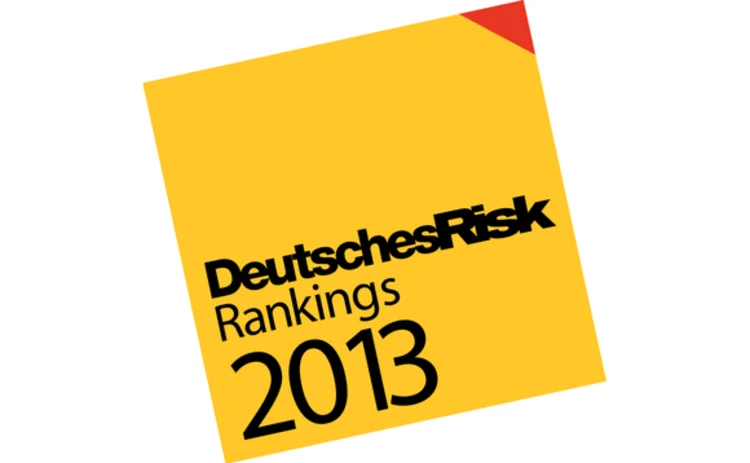
Deutsches Risk Rankings 2013
The top three banks in Germany retained their positions in this year’s Deutsches Risk rankings, but all are adapting to structural change

View the Deutsches Risk Rankings 2013 results
Over the past year, as interest rates stayed near record lows, banks have been doubly challenged – to respond to investors’ needs to generate yield and continue the clean-up that was started after the financial crisis. An ethos of simplicity is being applied to both efforts in Germany.
Looming on the horizon for all financial institutions is implementation of the Basel III capital adequacy framework, and efforts to prepare over the past year have assumed a degree of urgency.
“Regulation projects are big and take years to complete, but now they are getting closer and more real, particularly for banks, with risk-weighted asset charges and leverage ratios all set to kick in,” says Nicolas David, head of OTC derivatives trading, Germany, at Deutsche Bank in Frankfurt. “The big theme over the past year is that people have been thinking about cutting complexity and looking for compression opportunities.”Banks with large portfolios may have typically looked to reduce the number of trades with a large counterparty from 500 to 30, David says, keeping risk parameters unchanged but perhaps compromising on cash flows, with the aim of achieving a lower weighting on the balance sheet.
Portfolio simplification
Deutsche Bank, which was rated number one bank overall and number one in interest rates in Germany in the 2013 Deutsches Risk rankings, leveraged its powerful balance sheet to take on large-scale portfolio clean-ups associated with banks such as Erste Abwicklungsanstalt (formed to unwind the assets of West LB) or IKB Deutsche Industriebank AG, which was bailed out in 2007 following subprime losses.
“We have traditionally had a big footprint in the complex interest rate space and there has been a lot of demand to get out of or restructure complex risks,” David says. “We are one of the few banks willing to help clients where they have legacy products with cross-asset pay-offs.”
Another bank to have focused in the past year on portfolio simplification is Barclays, a move the bank says is the result of continuing regulatory change and structural challenges in the German banking sector.
“Many people speak of Germany as the healthiest patient in the euro crisis,” says London-based Daniel Wrobel, who co-heads up Barclays’ distribution for Germany and Austria. “That is true from a sovereign perspective, but financial institutions are not in such a healthy state. The banking market is fragmented, comprising one-third public sector and savings banks, one-third co-operative banks and one-third private sector banks. That has meant many players have struggled to reach economies of scale, which is one reason some went into international wholesale banking adventures, which did not always turn out well.”
As banks fret over risk-weighted and legacy assets, the investment community in Germany has been faced with the problem of how to create additional yield in an environment of historically low interest rates. The yield on the German 10-year Bund fell to 1.2% in May, compared with an average of 5.7% in the past 33 years, according to website Trading Economics.
German insurer books remain dominated by with-profits liabilities, with guaranteed yields traditionally set at 4% or 5%. That has dropped to an average of around 2.9% as central bank rates have declined, according to Barclays, but is still above the returns available in sovereign debt markets.
“Investors have moved away from asset liability management and hedging, and towards generating yield,” David says. “So they have been looking to sell optionality while at the same time focusing on simple plain-vanilla structures with easy-to-understand payoffs.”
Deutsche Bank responded to demand for multi-callable notes in longer maturities, referencing high-quality names such as development bank KfW and the European Investment Bank. Zero-callable structures were also popular, again reflecting a desire for simplicity.
A new arrival
Another bank to have made a virtue of focusing on the impact of regulatory change was Landesbank Baden-Württemberg (LBBW), a new arrival in the top echelons of the Deutsches Risk rankings. LBBW excelled in the interest rate space, rising to top five positions in swaps, options, forward rate agreements, repos, cross-currency swaps and exotics.
According to Stephan Meier, LBBW´s head of trading interest rates derivatives based in Stuttgart, the trend towards lower volumes and simple products was offset by the complexity of regulatory and accounting challenges. However, client business models remain largely unchanged. “Asset managers are still looking for pick-up while treasuries are asking to hedge positions,” he says.UniCredit was another bank to perform in the rates space, rising from fifth position in 2012 to second in 2013. However, the bank was most successful in equities, where it retained its number one position, focusing on simple products, which reflected a broad investor appetite for capital preservation.
“The euro crisis is still very much at the forefront of people’s minds, meaning whilst the DAX reached an all-time high, clients have preferred products that offer quasi-fixed yields over capital appreciation,” says Patrick Sollinger, Munich-based head of equity derivatives trading at UniCredit.
Some 67% of notional outstanding structured products in Germany are capital guaranteed notes, according to UniCredit, while yield enhancement is defined by conservative structures such as reverse convertible notes, or barrier reverse convertibles, which offer partial capital guarantees.
“With interest rates so low there has been some hunger for yield, but still investors have been willing to give up some of the upside, which was available by going outright long the stock market,” Sollinger says. “They were also much more focused on the short end, and liquidity on the long end has virtually dried up.”
Volumes in the structured equity space have picked up as the market has rallied but payoff innovations remain few and far between. However, one area to have seen new ideas is the target volatility space, where investors have been willing to take option risk in a funded format, taking implied volatility out of the equation. Dealers were able to offer attractive pricing by hedging out volatility risk on the products, which referenced single-names, indexes and baskets of funds.
As the structured note space has become increasingly standardised and regulatory costs have risen, margins are being squeezed, Sollinger says, prompting some banks to exit the business.
“I see further consolidation with banks offering scale with regard to retail platforms dominating,” he says. UniCredit launched a new platform this year for advisers offering a pre-defined set of payoffs and tools for value-at-risk calculations and risk key performance indicators.
A move to single stocks
According to Société Générale, as macro risks have dissipated in recent months, asset managers have moved away from index option strategies and towards single stocks, a trend reflected in the listed space, where index product volumes are down 25%–50% since the start of the year.
“At the beginning of the year it was more focused on hedging, but now that has reduced,” says Michael Gypkens, head of flow sales, Europe, global equity flow at Société Générale in Frankfurt. “However, low implied volatilities have meant that overwriting clients have been a little bit disappointed selling puts and calls.”
In the foreign exchange business, Commerzbank retained its dominant position in all products apart from swaps, where it lagged Deutsche Bank. It was particularly strong in exotics, where it held almost a quarter of votes cast.
The bank says the key to its success was a balanced portfolio, a focus on risk advisory and a willingness to follow clients into emerging markets, particularly South America.
The bank has also leveraged its huge small and medium-sized enterprise franchise, where it says demand for complex solutions remains much stronger than among multinationals that preferred vanilla swaps and options. Germany’s Mittelstand showed strong appetite for target forwards, which enabled them to hedge at better-than-market rates.
“Target forwards enabled corporate clients to sell volatility and over the past year they benefitted from the declining volatility trend,” says Gerald Dannhaeuser, global head of FX sales at Commerzbank in Frankfurt.
One of the common denominators for banks that were successful in Germany in the past year was a willingness to focus not just on products, but on the whole value chain around the relationship, from risk advisory to execution, settlement and collateral management. Commerzbank was particularly strong in that area, retaining its number one position in advisory.
“It used to be about siloes, but now it’s about market services,” Dannhaeuser says. “Clients do not want products, they want strategy, and relationship managers must put in an enormous amount of work to provide analysis of what the client needs.”
Export growth to emerging markets
While German exporters continue their growth in China, they are also increasingly focused on Latin America, and those able to provide consistent pricing in markets such as Brazil, Mexico and Colombia were rewarded, according to Commerzbank. “You want to be the preferred partner, which means you need to provide the right currency pairs, always be open, offer low latency and also continuity, which means not pulling away in front of market data,” says Dannhaeuser.
Among banks, access to foreign currency funding remained a challenge, and many German institutions continued to fund in euros and swap into dollars or other currencies. While the basis swap market has improved in recent months, it remains structurally weak.
“For medium-sized institutions, issuing in dollars is still difficult, and while the basis swaps market is a solution it can be expensive during times of volatility,” says Wrobel. “That’s because the market is predominantly one way – with European institutions looking to refinance dollar assets – and when there is a crisis the basis tends to spike, which means FX basis swap portfolios can be very volatile.”
In the credit space, asset managers rather than banks have been the standout players over the past year, with pension funds increasingly assigning mandates to use derivatives where they can’t source duration through the bond market. However, the booming market for credit derivatives in Germany was in retail, with the credit-lined note space seeing a surge of activity.
“The accent is on simple products based on baskets of high-quality names, with a view to enhancing spreads by taking credit risk against the issuer,” says Christian Porath, head of fixed income for Germany at BNP Paribas, based in Frankfurt. “Also, the index skew business was very interesting for real money accounts, which we offered packaged into a bond.”
Looking forward, the key driver for large parts of the derivatives market is the outlook for interest rates, with any move by the US Federal Reserve to lift rates likely to have knock-on effects in Europe.
“The business of the next six months largely depends on the level of interest rates,” says Meier. “A lot of clients are still exposed to rising rates, as they have omitted to hedge themselves. Any sudden upward movement in rates could result in increasing investment and hedging activities.”
Only users who have a paid subscription or are part of a corporate subscription are able to print or copy content.
To access these options, along with all other subscription benefits, please contact info@risk.net or view our subscription options here: http://subscriptions.risk.net/subscribe
You are currently unable to print this content. Please contact info@risk.net to find out more.
You are currently unable to copy this content. Please contact info@risk.net to find out more.
Copyright Infopro Digital Limited. All rights reserved.
As outlined in our terms and conditions, https://www.infopro-digital.com/terms-and-conditions/subscriptions/ (point 2.4), printing is limited to a single copy.
If you would like to purchase additional rights please email info@risk.net
Copyright Infopro Digital Limited. All rights reserved.
You may share this content using our article tools. As outlined in our terms and conditions, https://www.infopro-digital.com/terms-and-conditions/subscriptions/ (clause 2.4), an Authorised User may only make one copy of the materials for their own personal use. You must also comply with the restrictions in clause 2.5.
If you would like to purchase additional rights please email info@risk.net
More on Rankings
TP ICAP: leveraging a unique vantage point
Market intelligence is key as energy traders focus on short-term trading amid uncertainty
GEN-I: a journey of ongoing growth
GEN-I has been expanding across Europe since 2005 and is preparing to expand its presence globally
Bridging the risk appetite gap
Axpo bridges time and risk appetite gaps between producers and consumers
Axpo outperforms in the Commodity Rankings 2024
Energy market participants give recognition to the Swiss utility as it brings competitive pricing and liquidity to embattled gas and power markets
Hitachi Energy supports clients with broad offering
Hitachi Energy’s wide portfolio spans support for planning, building and operating assets. Energy Risk speaks to the vendor about how this has contributed to its strong Software Rankings performance in 2024
Market disruptions cause energy firms to seek advanced analytics, modelling and risk management capabilities
Geopolitical unrest and global economic uncertainty have caused multiple disruptions to energy markets in recent years, creating havoc for traders and other companies sourcing, supplying and moving commodities around the world
ENGIE empowers clients globally to decarbonise and address the energy transition
In recent months, energy market participants have faced extreme volatility, soaring energy prices and supply disruptions following Russia’s 2022 invasion of Ukraine. At the same time, they have needed to identify and mitigate the longer-term risks of the…
Beacon’s unique open architecture underlies its strong performance
Recent turmoil in energy markets, coupled with the longer-term structural changes of the energy transition, has created a raft of new challenges for market participants







